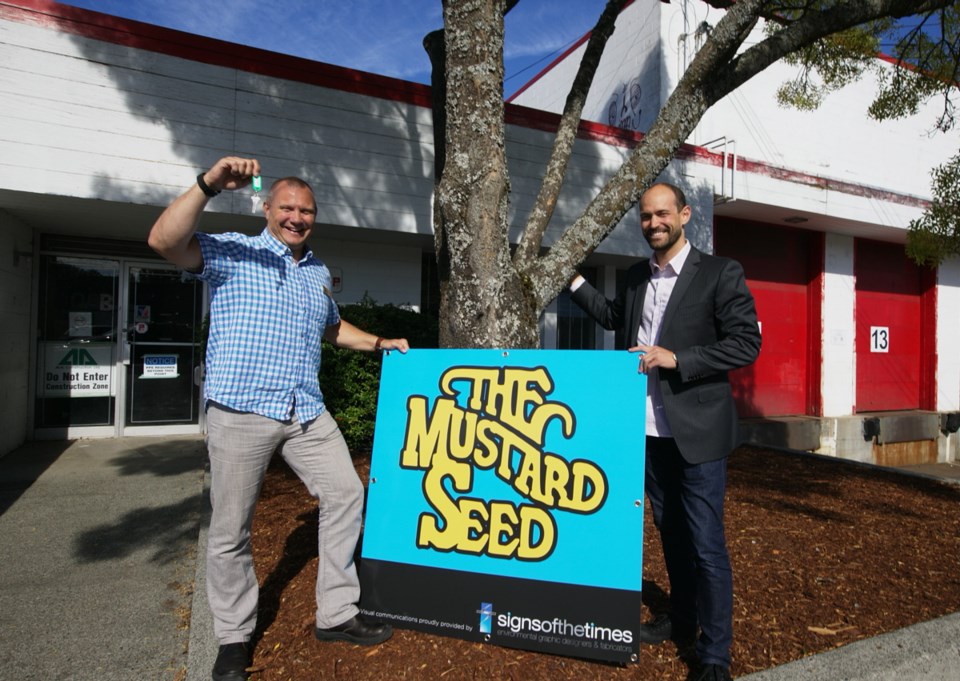It’s an empty warehouse that’s full of hope. In six weeks, 808 Viewfield Rd. will become a distribution hub for massive amounts of perishable food not currently collected or distributed by organizations that are dedicated to feeding hungry people.
“It’s been such a long-term process to take possession of this facility, it’s quite a relief to have the key in our hands,” said Allan Lingwood, development director of the Mustard Seed Food Bank.
“It will be quite a facility once it’s done.”
The long-awaited Food Rescue Project means that the Mustard Seed and more than 40 other agencies involved with food distribution in the capital region will have a 13,500-square-foot clearinghouse for tonnes of surplus or less than perfect-looking fruits, vegetables and dairy products that are not currently donated because of the lack of refrigeration.
A 700-square-foot refrigerator is on order and will be installed along with multiple sinks, industrial shelving and other necessities for the “cleaning and gleaning” of food picked up by two Mustard Seed trucks, one of them newly purchased, Lingwood said.
“All of our agencies will be busier delivering food quickly,” he said, citing destinations including Our Place, the Salvation Army and seven neighbourhood houses in Blanshard and Burnside-Gorge areas, among others.
“We want to empower the neighbourhood houses to do more food-security work close to home … without the pain of the big commute. There is less stigma getting food from community centres — everyone goes there to connect into community.”
The Mustard Seed already gets an average of 450 kilograms of fruits and vegetables dropped off daily by Country Grocer, LifeCycles and residents. That amount will greatly increase once there is the right place to sort, organize and package it, Lingwood said Friday. Thrifty Foods is onside, and all grocers will be encouraged to donate their surplus perishables.
More than food donations will be required to make the warehouse work.
One hundred “fresh faces” in the form of new volunteers are required to help organize the incoming perishables, and all of them should have or be willing to take FoodSafe training. Such a large facility has extra operating costs, meaning cash donations are required. Only half the operating dollars needed for the next year are in hand.
“We rely on the $100 to $500 donor — that’s our bread and butter,” Lingwood said.
The Mustard Seed is renting the warehouse from the Capital Regional District for $12,500 a month for the next three years. Both it and the neighbouring warehouse are on four acres that are for sale as the CRD tries to recoup $17 million it spent on the site in 2013 with the idea of opening a sewage-sludge plant. That idea was nixed by neighbourhood outrage.
“Both buildings remain for sale while they are being leased,” said CRD spokesman Andy Orr.
The lease would stand up with new owners, Lingwood said.
The pickups of perishable food do not reduce the need for donations of canned and packaged foods that are the Mustard Seed’s mainstay as the third-largest food bank in B.C. after ones Vancouver and Surrey.
Even now, dried rice and pasta, oatmeal and granola are urgently needed, and “peanut butter and tuna are gold,” said the Mustard Seed’s new executive director, Bruce Curtiss, who moved from Vancouver’s Downtown Eastside a few weeks ago, bringing expertise in food security and ministry.
“Where Bruce has really spent a lot of time is assisting in the transformation of an individual from broken to whole,” Lingwood said. People need more than food for sustenance, such as programs offered for spiritual and mental growth.
“Victoria is an amazing place — people have beautiful hearts here,” Curtiss said. He hopes the perishables project will decrease the “fear, stress and trauma” experienced by people who do not know where their next meal is coming from. Even five years ago, B.C. Provincial Health Services Authority reported that a nutritious food basket for a family of four was $869 per month.
Refrigeration will make an “astronomical difference” in feeding hungry people, Curtiss said. “It gives you the capacity to store the excess and distribute it as needed to the people we’re serving.”
Next year, the Mustard Seed will install a processing kitchen to turn very ripe produce into jams or other preserved food. Perishable nutritious food comprises one-third of the contents of a current Mustard Seed hamper, thanks to local farmers, retailers and residents with gardens and fruit trees. The aim is 50 per cent fresh food.
About 50,000 people lack sufficient income for balanced diets in the capital region, Lingwood said. Of those, only 20,000 use food banks, with the rest malnourished, some skipping meals for the sake of their kids and some reluctant to ask for help.
“You can fast for a time, but you must receive proper nutrition for your body and brain to function normally,” Lingwood said.
“We have a five-year plan to accomplish food security in the CRD. That means that the 50,000 will be fed.”
The Mustard Seed food bank will continue to distribute hampers at its Queens Avenue location. Despite the staggering amount of food donated to the Mustard Seed, it’s enough for only one hamper per month per recipient, with food for about one week.
The seed money for the Food Rescue Project came from several Rotary clubs that raised $100,000 selling raffle tickets for a car donated by Thrifty Foods, then matched by the Victoria Foundation. Thrifty Foods stores are on board to provide fruits, vegetables, dairy and other perishable products, in addition to the 450,000 kilograms of food donated last year, donations of baked goods and customer bins.
Currently, the Mustard Seed receives 800,000 kilograms of food a year, distributing about 2,450 kilograms per day, five days a week, once spoilage and donations to other agencies are factored in.



